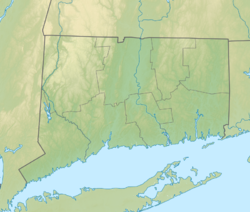Rocky Neck State Park
| Rocky Neck State Park | |
|---|---|
 Bride Brook Salt Marsh | |
| Location | East Lyme, Connecticut, United States |
| Coordinates | 41°18′15″N 72°14′52″W / 41.30417°N 72.24778°W[1] |
| Area | 708 acres (287 ha) |
| Elevation | 66 feet (20 m)[1] |
| Established | 1931 |
| Administered by | Connecticut Department of Energy and Environmental Protection |
| Designation | Connecticut state park |
| Website | Official website |
Rocky Neck Pavilion | |
 | |
| Location | Lands End Point, Rocky Neck State Park, East Lyme, Connecticut |
| Area | 6.5 acres (2.6 ha) |
| Built | 1934 |
| Built by | Federal Emergency Relief Administration (FERA), Civilian Works Administration (CWA) |
| Architect | Barker, Russell F., et al. |
| Architectural style | Rustic |
| MPS | Connecticut State Park and Forest Depression-Era Federal Work Relief Programs Structures TR |
| NRHP reference No. | 86001745 |
| Added to NRHP | September 4, 1986 |
Rocky Neck State Park is a public recreation area encompassing 710 acres (290 ha) on Long Island Sound in the town of East Lyme, Connecticut, United States. The park encompasses a tidal river, a broad salt marsh, white sand beaches, rocky shores, and a large stone pavilion dating from the 1930s. It is managed by the Connecticut Department of Energy and Environmental Protection.[2]
History
[edit]During the 19th century, various fertilizer operations occupied the site.[3] The park traces its beginnings to 1931, when conservationists purchased the land and held it until the state legislature authorized state purchase. During the Great Depression, a 356-foot, timber-and-granite pavilion was constructed by federal relief workers.[2]
Features
[edit]- Pavilion
The Ellie Mitchell Pavilion is a Rustic-style building completed in 1936 by the Works Progress Administration. The curved masonry building stands more than 350 feet (110 m) long and 80 feet (24 m) wide.[4] It is the largest Depression-era structure in the state.[5]
Construction began in the early 1930s as part of an effort to ease crowding at Hammonasset State Park. Much of its timber and granite were drawn from local suppliers and quarries and from an abandoned fish fertilizer plant on the grounds.[4] Supporting pillars were fashioned from trees cut from each of the state parks and forests.[2] The pavilion was handed over to the state in October 1936[6] and opened as the Ellie Mitchell Pavilion. Visitors could purchase food, eat in the dining areas, and warm themselves by eight fireplaces during cooler months.[4] In 1986, the pavilion and its surrounding 6.5 acres (2.6 ha) were listed on the National Register of Historic Places.[7]
- Footbridge
The park is crossed by the Northeast Corridor, Amtrak's main line from New York to Boston, on a right-of-way first chartered in 1848 by the New Haven and New London Railroad. A 1934 footbridge carries pedestrians over the tracks between the pavilion and its parking lot. The 36-foot (11 m) arched steel bridge has been documented by the Historic American Engineering Record, which describes it as "an unusual surviving example of a railroad footbridge."[5]
- Access road
The park has its own exit (exit 72) on the Connecticut portion of Interstate 95. This exit is for the Rocky Neck connector, which is designated as the unsigned Connecticut Special Service Road 449.[8]
Activities and amenities
[edit]The park offers picnicking, saltwater fishing, saltwater swimming, a campground with 160 sites, and interpretive programs. Hiking trails lead to a salt marsh, Baker's Cave, Tony's Nose, Shipyard, and other points of interest.[2]
See also
[edit]- List of bridges documented by the Historic American Engineering Record in Connecticut
- National Register of Historic Places listings in New London County, Connecticut
References
[edit]- ^ a b "Rocky Neck". Geographic Names Information System. United States Geological Survey, United States Department of the Interior.
- ^ a b c d "Rocky Neck State Park". Connecticut Department of Energy and Environmental Protection. Retrieved August 27, 2024.
- ^ "Local Landmarks: Rocky Neck State Park". East Lyme Historical Society. Archived from the original on March 4, 2016. Retrieved April 14, 2014.
- ^ a b c "Abundant wildlife drives the history of Rocky Neck State Park". ConnecticutHistory.org. Connecticut Humanities. Retrieved October 7, 2013.
- ^ a b Adams, Virginia H.; Kierstaad, Matthew A. "Rocky Neck Park Trail Bridge" (PDF). Historic American Engineering Record. Washington, D.C.: Library of Congress. Retrieved January 27, 2015.
- ^ "Connecticut State Parks". Hartford Courant. Archived from the original on April 15, 2014. Retrieved October 7, 2013.
- ^ Mary E. McCahon, Connecticut Historical Commission (June 1985). "Historic Resources Inventory: Rocky Neck Pavilion". National Park Service. and accompanying photo from 1985
- ^ "Secret Route List". Connecticut Roads. Kurumi. Retrieved June 9, 2011.
External links
[edit]- Rocky Neck State Park Connecticut Department of Energy and Environmental Protection
- Rocky Neck State Park Map Connecticut Department of Energy and Environmental Protection
- Historic American Engineering Record (HAER) No. CT-165, "Rocky Neck Park Trail Bridge, Foot trail over New Haven Railroad, Old Lyme, New London County, CT", 6 photos, 5 data pages, 2 photo caption pages
- East Lyme, Connecticut
- State parks of Connecticut
- Long Island Sound
- Parks in New London County, Connecticut
- Beaches of Connecticut
- Historic American Engineering Record in Connecticut
- National Register of Historic Places in New London County, Connecticut
- Landforms of New London County, Connecticut
- Protected areas established in 1931
- 1931 establishments in Connecticut
- Campgrounds in Connecticut
- Nature centers in Connecticut
- Event venues on the National Register of Historic Places in Connecticut
- Works Progress Administration in Connecticut


